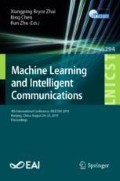Abstract
In the big data era, data and information processing is a common concern of diverse fields. To achieve the two keys “efficiency” and “intelligence” to the processing process, it’s necessary to search, define and build the potential links among heterogeneous data. Focusing on this issue, this paper proposes a knowledge-driven method to calculate the semantic similarity between (bilingual English-Chinese) words. This method is built on the knowledge base “HowNet”, which defines and maintains the “atom taxonomy tree” and the “semantic dictionary” - a network of knowledge system describing the relationships between word concepts and attributes of the concepts. Compared to other knowledge bases, HowNet pays more attention to the connections between words based on concepts. Besides, this method is more complete in the analysis of concepts and more convenient in calculation methods. The non-relational database MongoDB is employed to improve the efficiency and fully use the rich knowledge maintained in HowNet. Considering both the structure of HowNet and characteristics of MongoDB, a certain number of equations are defined to calculate the semantic similarity.
Access this chapter
Tax calculation will be finalised at checkout
Purchases are for personal use only
References
Banker, K.: MongoDB in Action. Manning Publications Co., Shelter Island (2011)
Brad, D.: The Definitive Guide to MongoDB: The Nosql Database for Cloud and Desktop Computing. Springer, Heidelberg (2010). https://doi.org/10.1007/978-1-4302-3052-6
Vohra, D.: Migrating mongodb (2015)
Boicea, A., Radulescu, F., Agapin, L.I.: MongoDB vs oracle – database comparison. In: Emerging Intelligent Data and Web Technologies (EIDWT), 2012 Third International Conference. IEEE (2012)
Dong, Z., Dong, Q.: HowNet - a hybrid language and knowledge resource. In: Natural Language Processing and Knowledge Engineering, 2003. Proceedings. 2003 International Conference. IEEE (2003)
Xu, Y., Fan, X.Z., Zhang, F.: Semantic relevancy computing based on hownet. J. Beijing Inst. Technol. 25(5), 411–414 (2005)
Hows, D., Membrey, P., Plugge, E., Hawkins, T.: Installing mongodb. In: Definitive Guide to Mongodb, pp. 17–31 (2013). http://doi.org/10.1007/978-1-4302-5822-3_2
Miller, G.A.: Wordnet: a lexical database for English. Commun. Assoc. Comput. Mach. 38(11), 39–41 (1995)
Diao, L., Yan, H., Fuxue, L.I., Xiumin, L.I., Lei, G.: An improved HowNet-based algorithm for semantic similarity computation (2017)
Bai, J., Bu, Y.: An improved algorithm for semantic similarity based on HowNet. In: 2018 2nd International Conference on Data Science and Business Analytics (ICDSBA), pp. 65–70 (2019)
Zhu, X.H., Ma, R.C., Sun, L., Chen, H.C.: Word semantic similarity computation based on HowNet and CiLin. J. Chin. Inf. Process. 30(4), 29–36 (2016)
Nie, H., Zhou, J., Guo, Q., Huang, Z.: Improved semantic similarity method based on HowNet for text clustering. In: 2018 5th International Conference on Information Science and Control Engineering (ICISCE), pp. 266–269. IEEE (2018)
Zhang, S., Ouyang, C., Yang, X., Liu, Y., Liu, Z., et al.: Word semantic similarity computation based on integrating HowNet and search engines. J. Comput. Appl. 37, 1056–1060 (2017)
Guo, X., Zhu, X., Li, F., Li, Q.: A new semantic similarity measurement based on HowNet concept tree. In: 2016 International Forum on Management, Education and Information Technology Application. Atlantis Press (2016)
Acknowledgement
This work was supported by the “Fundamental Research Funds for the Central Universities Nos. 3082018NS2018057”, the National Natural Science Foundation of China (61872182), the National Natural Science Foundation of China under Grant No.61402229 and No.61602267, the Open Fund of the State Key Laboratory for Novel Software Technology (KFKT2018B19) and the Open Fund of the Ministry Key Laboratory for Safety-Critical Software Development and Verification (1015-XCA1816401).
Author information
Authors and Affiliations
Corresponding author
Editor information
Editors and Affiliations
Rights and permissions
Copyright information
© 2019 ICST Institute for Computer Sciences, Social Informatics and Telecommunications Engineering
About this paper
Cite this paper
Cao, J., Wang, T., Li, W., Tao, C. (2019). A Method of Calculating the Semantic Similarity Between English and Chinese Concepts. In: Zhai, X., Chen, B., Zhu, K. (eds) Machine Learning and Intelligent Communications. MLICOM 2019. Lecture Notes of the Institute for Computer Sciences, Social Informatics and Telecommunications Engineering, vol 294. Springer, Cham. https://doi.org/10.1007/978-3-030-32388-2_27
Download citation
DOI: https://doi.org/10.1007/978-3-030-32388-2_27
Published:
Publisher Name: Springer, Cham
Print ISBN: 978-3-030-32387-5
Online ISBN: 978-3-030-32388-2
eBook Packages: Computer ScienceComputer Science (R0)

